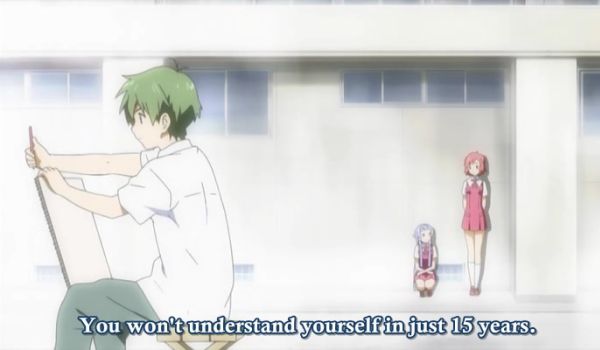
You won’t understand yourself in just 15 years – and probably not even 33, barring divine incarnation. But over the years, we catch the occasional glimpse of ourselves, and of the world, without the heavy curtains of habit, prejudice, custom and common assumptions.
(I wrote this post earlier this month but can’t see I have posted it before. Â I probably felt that I was not worthy to write about such things. Â I still am not, but we must say all the words that should be spoken, before they are lost forever.)
I know I wrote about awareness last month, but I think it is worth visiting again. I remember how little I understood – and how much I misunderstood – about it myself for most of my adult life.
Take the connection between awareness and intelligence, for instance. There is clearly a connection. People who are more intelligent tend to be aware of more things at the same time. (A positive correlation, as my high school teacher would call it.) This is most noticeable when people are severely lacking in the top domain, so to speak. They can be blissfully unaware of the effect they have on others, or of the consequences for themselves of what they do. There are also other small effects, like bumping into people and objects because they are looking another way or thinking of something else.
But then again you have the distracted professor stereotype. It is not all fiction, either. I have seen it firsthand. And to some degree I have been that way myself. Not quite the type who puts jam in the tea, and I have mostly had excellent situational awareness, but nobody would call me practical. Let us agree that I have a very low dust awareness, to put it that way. And my social skills were abysmal for most of my life. Then they improved. (And then I stopped being social at all, but that’s a slightly different matter.)
Experience plays a role in displayed awareness: When we have done something often enough, we no longer need to think consciously about it, and can move our awareness to other areas. It will look as if we are more aware, but in this case that is not necessarily true. It can be, however, if we use our newfound freedom from details to expand our view and take in a wider perspective. We can get an overview that integrates different things we were aware of separately, but were not aware of their connections.
But often experience causes us to become less aware, creatures of habit. There is actually a default network in the brain, a connected circuit of parts, and it works diligently to keep our awareness down, or so it seems. Our lives get automated, and when we have free time, this “default network†will immediately present us with some mind task that can distract us: Memories, plans, daydreams and what-if scenarios. That way we don’t need to be present in the moment and notice the world or, even worse, our own awareness.
(A small voice in my head says that I may be over-biologizing here. If this default network was The Enemy, any number of people would become Enlightened by falling and hitting their head. More likely this is a necessary part of the brain that just happens to pick up the slack when we don’t use the slack for other purposes.)
This is peculiar, indeed: There seems to be a process that slowly increases through life, removing our awareness, making us function more and more automatically. This is widely regarded as the reason why life seems to speed up as we grow older. Where once a summer vacation was interminably long, now entire generations swirl before our eyes and are gone, and then it is over, and where did the years go?
But even for us who have vowed to not kill time, for it is our life – even for us, the same mechanism is lurking within. To expand awareness is to swim against the current of time itself. The strange part is that it is such a simple, easy, even pleasant thing to do, and yet we don’t. We shrink back.
I still think one of the best descriptions of this conundrum is the Norwegian song “Floden†(The River) by Bjørn Eidsvåg, which I referred to on November 24th, 2006. (Is it really that long ago? Where did the years go?) Having still not heard an official English translation (please comment or mail me if you know one) I shall simply repeat my own near-literal and none too lyrical translation from back then.
Each time I dare to bathe in you, I become whole and clean;
and I feel a healing shiver go through marrow and bone.
I wonder now, why don’t I bathe more in you?
Why, why, when I feel the good you do to me?
It can almost seem like I try to avoid you
and am horribly afraid of the grace and joy you give me…
Peculiar, peculiar!
Yes, each time we reach into higher awareness, we feel almost instinctively that it is a good thing, we realize that this is how life was meant to be lived, we feel it rebalance our body and soul. And yet at some point we shrink back, driven by a fear we cannot explain. I believe this is a guard that is set around us to keep us from going insane. Think of consensus reality as an island we all live on. If you go off the deep end, you leave behind everyone and everything you have in this life, and you better have a really good reason for that!
So what I try to do is extend consensus reality a little bit at a time, here on the shallow end. To become a little bit more aware of what I do, what I say, what I feel, what I think. A little bit more aware of my motivations, of my mortality, and of the fact that not everything is about me. More about the things that are not about me in the future, if any.
For now, let me assure you that Ken Wilber and his book-writing friends are adding their voice to the unlikely choir of Jesus, Bill Harris, the Buddha and me, urging you all to watch and wake. (Although doing so might deprive both Centerpointe Research Institute and even the Integral Institute of some customers, I think. Eventually. I suppose theoretically some readers may even outgrow the Chaos Node. Nah…)

